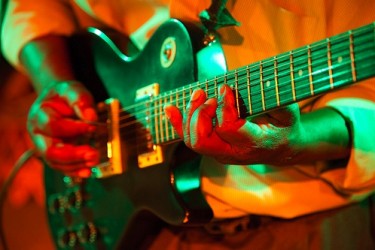After a season of elections [1] and cyclones [2] in Mozambique, the country was owed some entertainment and good news. One of the highlights of Mozambique's cultural calendar, the Marrabenta Festival (celebrating its fifth year), came just in time.
The Festival consists of musical events in the capital Maputo, with the highlight being an acoustic musical train trip to Marracuene. The train picks up music fans for free along the way, taking them to the Festival's finale, a lively outdoor concert that lasts until dawn.
The train trip this year was documented by YouTube user Charline Van Deth [4]:
Website MozambiqueTV [5] shared a clip from private television station STV on the platform of Maputo's historic train station [6] before the train departed. The clip features an interview with a smiling producer of the Festival, Lito, with Logaritmo Productions:
Marrabenta [7] is a genre of music closely linked to African urban life and modernity, making the train trip a delightful match. Marrabenta arose in the south in the 1930s and 1940s, the word coming from the verb rebentar (to break) which is a way people describe dancing. One urban theory is that the word originally described cheap guitar strings breaking with the energetic playing of musicians.
The genre was a mix of traditional Mozambican rhythms and new guitar arrangements inspired by that period's global explosion of popular music fuelled by radio. Pioneering artists such as Dilon Djindji [8], Fany Mpfumo [9], and Wazimbo [10] (and the Orchestra Marrabenta Star) made an ever-lasting mark on Mozambican music.

Guitar is a key feature of Marrabenta, photo courtesy of D J Clark (www.djclark.com)
Ever since its beginnings in colonial Lourenço Marques (now Maputo), writes nostalgic website Xirico [11] [pt]:
A música é um dos atributos culturais mais marcantes do povo moçambicano. O primeiro acorde provoca o primeiro movimento que ninguém ensinou. Depois não há força para resistir ao chicuembo da marrabenta. O requebro sincopado das ancas, uma mão na nuca outra atrás das costas, movimentos sensuais…
Photographer DJ Clark captured the essence of the festival last year in a stunning photo album [12]. This video from the Marrabenta Festival in 2010 by YouTube user TheMarrabenta [13] shows how the Festival is living proof of the power of marrabenta to enchant generation after generation:
The Festival is a breath of fresh air in Mozambique and crucial to maintaining roots music, as critics such as Fortunato of the Matapa blog [14] pull no punches in relation to contemporary music
Local music does get its share of airplay here, but the thing, is, most of the current Mozambican (popular) music is nowhere near as interesting as the echos from its past. On Radio Maputo, you can hear a lot of local classics from the 70ies: they sound totally amazing, a diverse and experimental blend of tradition with pop influences. But nowadays about half of the musicians seem busy vocalizing the fact that Mozambican musicians need to find their own style. The other half seems more than happy selling whatever suits the mobile phone operators or the governing party.
In clear contrast to this kind of music were the headliners this year, the South African group the Mahotella Queens [15], celebrating their thirtieth anniversary. They just reinforced the links between popular South African music and Mozambican music, which have been intermingling since well before the railroads linked Johannesburg with Mozambique's then capital Lourenço Marques. Language groups transcends colonial borders, and the musical languages of neighboring South Africa and southern Mozambique have a great deal in common.
This year, @Verdade newspaper reported [16] that more and more foreigners take time out and travel to Mozambique for this unique musical moment. But the Festival has an economic impact in Marracuene irrespective of foreign visitors, with informal bars [17] and food stalls set up to sell palm wine [18], grilled chicken [19] and fried fish [20], where visitors from Maputo infuse cash into the town's economy.

